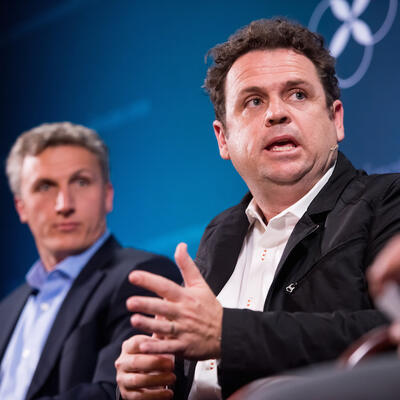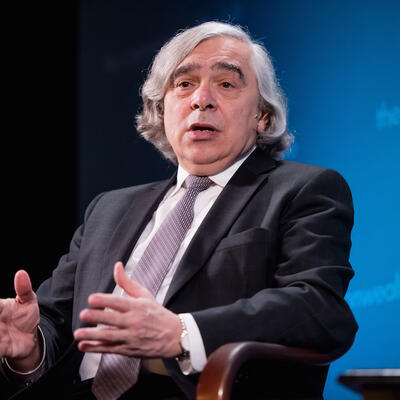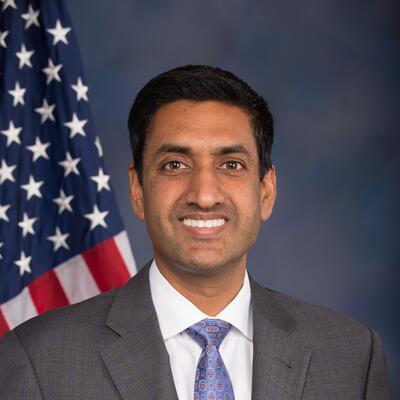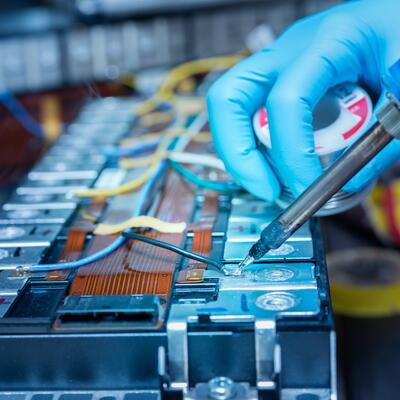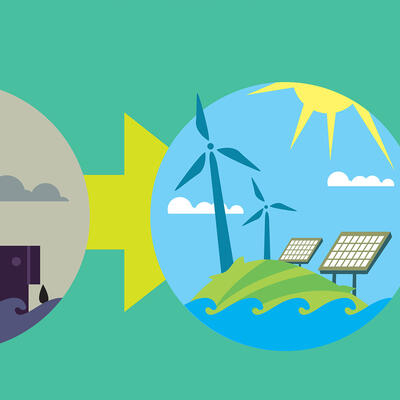
Can Clean Tech Clean Up Our Future?
Guests
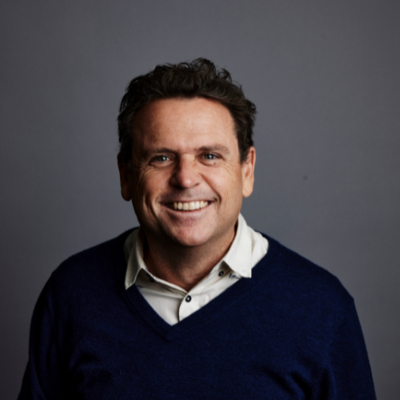
Danny Kennedy
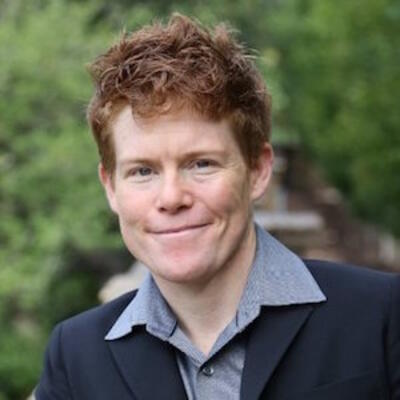
Holmes Hummel
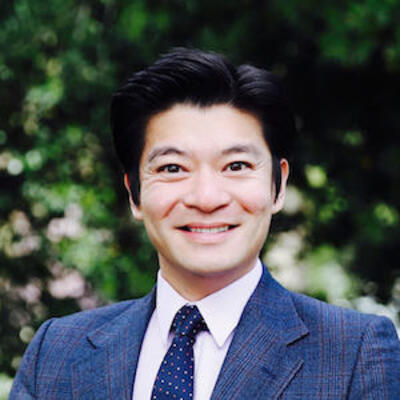
Andrew Chung
Summary
The clean tech sector is on the rise. What areas are most promising for growth, jobs and “gee-whiz!” innovation? What will the new administration bring?
Danny Kennedy, Managing Director, California Clean Energy Fund
Holmes Hummel, Founder, Clean Energy Works
Andrew Chung, Founder & Managing Partner, 1955 Capital
This program was recorded in front of a live audience at the Commonwealth Club of California on February 6, 2017.
Full Transcript
Greg Dalton: From the Commonwealth Club of California, this is Climate One, changing the conversation about America's energy, economy and environment. I'm Greg Dalton.
And today we’re discussing Clean Technologies and the young people and companies building and financing them. Companies in Silicon Valley are doing amazing things that you probably haven't heard of yet. One company for example turns scraps from your kitchen table into jet fuel used by United Airlines. That’s happening today. We’ll also hear about far out ideas such as coating fruits and vegetables with super thin shells that prevent insects from getting at them, thus reducing the need for pesticides. Sounds cool, but can you make a buck or get a job? Over the next hour, we’ll explore the clean economy in California and around the country. Along the way we’ll take questions from our live and sold-out audience here at the start of the Cleantech Week in the San Francisco Bay Area.
We have three entrepreneurs here with us to show us the way. Andrew Chung is founder and managing partner of 1955 Capital, a clean energy venture fund. He previously worked for the legendary venture capitalist Vinod Khosla. Holmes Hummel is founder of Clean Energy Works which helps people pay for energy upgrades to their home. She worked as a senior policy advisor in the U.S. Department of Energy in the Obama administration. And Danny Kennedy is managing director of the California Clean Energy Fund which finances startups. He previously cofounded the rooftop solar firm Sungevity. Please welcome them to Climate One.
[Applause]
Andrew Chung, I want to first ask you to share your story. Your parents fled the Cultural Revolution in China and came here and you started working in their restaurant at five years old. Tell us how you got there from that to what you're doing now.
Andrew Chung: Sure. So I was born in Chinatown, New York to a pair of immigrant parents who did leave China during the Cultural Revolution. And my first language was Cantonese Chinese so I didn't really speak English until I was about five. My parents left Chinatown because at the time it was a pretty rough place to raise a kid.
And they settled in a little hamlet in Bucks County, Pennsylvania and we started a Chinese restaurant like many Chinese immigrants do. And so as the one kid that sort of knew my ABC's watching Sesame Street, they put me out in the front, I sat on the stool. And because at the time I guess my math skills were pretty decent. I could add and multiply by six in my head and what not. They put me to work and I was a person greeting people in accented English when they came into the store.
Greg Dalton: And you sold your first business at 20.
Andrew Chung: Yeah, no 21.
Greg Dalton: Okay, thanks for being honest. Okay.
Andrew Chung: Yeah. So I was lucky to study math later at Harvard. All that matter training in the restaurant turned out to yield some good fruit. And while I was at Harvard I started my first company there. And instead of going to Wall Street like many of my mathematician classmates did, I ended up joining a company called Trilogy which was an enterprise software company in Austin, Texas. And there I was able to convince the CEO to give me a couple million bucks to start an e-commerce platform company using Trilogy’s platform technology and a year later sold it to a public company. So my first exit.
Greg Dalton: Holmes Hummel, a lot of work around the country trying to get more girls involved in STEM careers. So tell us how you got involved in your energy career.
Holmes Hummel: You know, I came of age after the Iraq war. And the geopolitical tension of our nation being aligned with the petroleum supply chains impressed me deeply about what clean energy could be as a life-saving drug. Flash-forward 20 years a career in the Clean Tech space has led me to be more committed than ever to access and affordability for the clean energy solutions that I know that we need. And that means for every one of every gender expression class, creed, nationality and it drives me to do the work I do today on inclusive financing.
Greg Dalton: Fabulous. Danny Kennedy, you sound like an immigrant. Are you really an immigrant?
Danny Kennedy: Strangely no, born in Los Angeles and to Australian parents who didn't like the pollution so much and looked for ways to get back to the blue skies of Sydney. So I grew up there but then came back to marry the love of my life who’s also been on your program, Mia Yoshitani. And is an activist in the community here and it was an excuse for me to try my entrepreneurial stuff.
Greg Dalton: Fabulous. We’ll get into some contributions, other immigrants are making, later. But let's talk about the Trump impact. People are concerned right now. What can the new administration, what can they do to slow down or impede clean energy. There’s a saying Andy Chung, in Silicon Valley not to invest in a company that is dependent on a particular policy because you don't like government. What do you see as the ability of the Trump administration to slow down, move toward clean energy?
Andrew Chung: I think one of the things that the DOE in the last 11 years that I've been involved with Clean Tech has done very successfully is foster fundamental science research and innovation. When I was at Lightspeed for five years and then as a partner at Khosla Ventures for another five years, we worked with a lot of companies that spun out of the ARPA-E program. Which was a special research group within the Department of Energy that focused on investing in very, very early stage breakthrough projects at national labs at universities within certain companies. And that type of innovation is absolutely critical to our energy future. Many of the financial investors like myself, or other groups have a more difficult time investing when it's only a professor and an idea for a new breakthrough in physics.
And over the last 10, 11 years because of the support of the DOE in projects like that, as well as other programs to foster the commercialization of these types of technologies, we had a lot of hope that America would be able to maintain that technology leadership. And one of the things that I worry about with the current administration is the level of focus and emphasis on a number of those types of projects. Which I hope will continue to exist because it is fundamental to American competitiveness, fundamental to our energy future. And it’s something that if we do it the right way, can allow us to maintain that type of leadership going forward.
Greg Dalton: Back in 2014, Rick Perry joined us for a discussion on energy. Take a listen to what then governor of Texas had to say.
[Start Clip]
Greg Dalton: Do you see any hope or future for a price on carbon, whether as a tax or any other way to help drive innovation?
Rick Perry: I think we have enough resources in this country if they’re allocated probably to fund the innovation that's in place. And I'm not a big believer that you have to go raise a new tax to go pay for.
We haven't done that in our home state. Matter of fact, we have grown quite a substantial economy over the course of the last 14 years without raising new taxes. When we deregulated the electricity market, we started a boom in Texas in the renewable energy sector. Today the nation’s leading developer of wind energy is not one of those progressive states on the East Coast or the West Coast. The number one wind energy producing state in the nation is along the Gulf Coast. It's in Texas.
[End Clip]
Greg Dalton: Rick Perry when he was governor of Texas, now heading the U.S. Department of Energy. Holmes Hummel, I’d like you to comment first. He says, don't need a carbon price, than you very much. Texas went ahead became number one in energy without it. How do you respond to that?
Holmes Hummel: Well certainly Texas does deserve a lot of credit for bringing on an incredible amount of renewable energy for their electricity market. However, Governor Perry, soon to be secretary of the Department of Energy has a steep learning curve as he assumes a leadership position of an agency I think he has publicly said he regrets suggesting should be dissolved. This is a really challenging position for the federal leaders who have civil service careers at the Department of Energy administrating billions of dollars in public portfolios to invest in the innovation ecosystem of the United States that keeps us competitive globally. As Andrew was just pointing out, to keep the United States relevant and leading in a clean energy future where each new breakthrough allows us to remain competitive in the enterprises that create jobs and create economic opportunity for our people.
Greg Dalton: Danny Kennedy, your take on how the Trump administration will handle clean energy and maybe Rick Perry won't – maybe he'll support it as he did in Texas.
Danny Kennedy: Yeah, either that or he’ll be run over by it. You know, there’s a moving train and they’re either gonna get on board or get caught in the tracks. Because it's no longer just about what the federal government does or what California does; what many other states do, and more importantly what the rest of the world does is going to drive this market. So that in 2020, at the end of this first and hopefully last time of this administration we will have solar at half the cost now and more than double the volume globally. We will have storage similarly scaling through this technology cost curve which has always been relentlessly down for wind solar storage. Which means we will be delivering the lowest-cost electricity of any technology anywhere ever in history. Lower than when coal was first invented as a steam boiling tool to drive turbines and so on.
So they can't stop that. They can try to get in the way. They can harm Americans who will miss out on the benefits of that which are cleaner air, climate protection, lower-cost electricity as I mentioned the jobs inherent in it just to name a few. Or they can get on the bandwagon as their major peers have in the world. China, for example, just announcing its next five-year plan, $320 billion worth to spend on this by 2020. The Indians, committing to 100 gigawatts by 2022 of solar alone, et cetera, et cetera. So, you know, it's for Trump and friends to decide whether they want to be riding the tide or fighting it. But I know he’ll lose.
Greg Dalton: Holmes Hummel, let’s pick up on the jobs. What are some of the most recent data on jobs in the clean energy sector? Where are they, where they’re growing, where are they?
Holmes Hummel: The United States energy employment report released in January gave us some very hopeful news about the tide in the United States.
Solar jobs up by a quarter, wind jobs up by a third together accounting for about half 1 million jobs more than half of which are in the construction and manufacturing sectors. But even twice as large as that is the jobs that were documented in the energy efficiency industries. Also accessible jobs in the trades and on top of those million jobs in energy efficiency was another near quarter million jobs in efficient vehicles – electric vehicles, plug-in hybrid vehicles and hybrid electric vehicles.
Danny Kennedy: Can I just jump in to point out the counterpoint which is that fossil fuels meanwhile are shrinking jobs. Like 150,000 permanently deleted from the workforce in America in that same period. And, you know, coal mining is now may be 60,000 strong in this country. We’re talking about a solar sector alone that employs 300,000 people. Then there are these other ones that Holmes just mentioned. The oil and gas production industry is maybe 120,000, 150,000 people in America. They’re not big employers; they just carry this mythical status in our mind while clean energy industries are the job creators in America coming out of the great recession year on year growing jobs 20% compounded per annum.
Greg Dalton: And Andrew Chung, why is there this perception that clean energy means pain and killing jobs, saving the environment, is that a false dichotomy?
Andrew Chung: I think so and, I'll call out something that Danny said earlier around what is happening globally and what is happening in other countries. If you look at China in 2013, one single year they deployed more solar in one year than the United States did in its entire history. Because of the level of government support around the initiative, the desperation in that country for cleaner air and renewable sources of energy and entrepreneurial movement around creating companies and creating jobs to be able to foster this type of new deployment there.
Similar stories in places like India, Southeast Asia and other places where again, perhaps unlike what we have here, where generally except for today – nice weather, blue skies, white clouds. In places like that you have millions of people dying every year of air pollution related disorders. So that has created this type of movement that has enabled a breathtaking growth in sectors like solar, wind, et cetera which has created a massive number of jobs in a lot of these countries and also creating new economies as a result.
And so Danny mentioned the five-year plan in China. The Chinese executives have essentially put clean energy as one of its top three initiatives for the next five years and arguably beyond. And part of that is what's good for the country in terms of the shift to better and cleaner resources, but the other part is what it can do to the middle class that's growing there in job creation and enabling a new type of economy to result.
Greg Dalton: Holmes Hummel, if the U.S. pulls out of Paris will some of that momentum slow down? The Paris climate accord?
Holmes Hummel: You know I think that the United States leadership in developing that accord can't be overstated. But I also think that the Trump administration’s declared intention to withdraw will not discourage the rest of the world from taking action that they know helps everyone improve their prospects of a livable planet. And viable economies that are otherwise really quite vulnerable to the kind of Earth system response that we should expect. The extreme weather the droughts, floods, fires and storms that take a toll on everyone's economy without arresting the contamination of the atmosphere with the carbon pollution that the accord was designed to arrest.
Greg Dalton: Andrew Chung mentioned China, not a democracy, but two key democracies have elections this year. There are elections in France, elections in Germany. They could also take a turn on energy as they taking turns on other things, Holmes Hummel.
Holmes Hummel: There's no doubt that there's a geopolitical tide of populism that is linked to people's perceptions about globalization and the way it affects their local economic opportunities. I want to return to my friend Danny Kennedy's perspective on the technological innovation path that we already see well charted. The relentless decline of the cost of the clean energy technologies allows them to cross in one market after another the points of cross-parity at which we see exponential growth in deployment. And when we do, that’s when we see the opportunities for economic growth take off. And people see that the self interest in participating in that economy overrides the discouragement of incumbents.
Greg Dalton: If you’re just joining us that’s Holmes Hummel, energy CEO. We also have Danny Kennedy, head of the California Clean Energy Fund and Andrew Chung, a venture capitalist from Silicon Valley. I'm Greg Dalton. Danny Kennedy, what are some dazzling things out there that we haven't seen yet that some gee-whiz technologies that might really be game changers that might really catch our attention we haven't heard about yet?
Danny Kennedy: Just one comes to mind as you asked that question is maybe not too gee-whiz but something I think is game changing, which are electric bikes. If you think about electric assist bicycles and how often you are starting to see them in the streets of this city and cities all around the world. They’re the most sold bicycle in Amsterdam these days, which says something if you know anything about the –
Greg Dalton: They pass the near the Golden Gate Bridge every weekend that pisses me off.
Danny Kennedy: Right. And I think that this ability to put lithium-ion in the energy density in that battery stack into a bicycle and to transform two-wheel mobility into something that can move a lot of people that aren’t just bicyclist in Lycra – as I expect you might be Greg – into, you know, people that use their bikes a lot and use them for also different functions, moving goods around and so forth. Is gonna change the way we plan cities. Is gonna change the walkable livable scale and nature of our communities. And that stuff is being pioneered by, you know, at the moment in America I think is a great story, a company called GenZe which stands for Generation Zero Emissions. And the entrepreneur behind it is salvation, gentlemen Vish Palekar is an Indian migrant to the U.S. now an American citizen. And he’s working for Mahindra, the giant conglomerate out of India that produces more tractors than John Deere. But he's producing electric assist bicycles in Fremont, California and electric assist scooters in Detroit, Michigan. And the scooters here in San Francisco are the Scoot system that you see on the streets. The fact that you’ve got like an Indian entrepreneur changing the game with electric mobility services, I think is one of those great examples of how weird and wacky and wonderful this world is and what is gonna come of it.
Greg Dalton: We sent one of our producers to check out a local company that's making Clean Tech fun. Very similar what Danny just mentioned. Boosted is a startup that makes skateboards powered by rechargeable lithium-ion batteries. You don't have to use your feet at all. You just ride by pressing a button on a remote control and yes, the boards which sell for up to, they start at $1,300 and up can make it up San Francisco Hills. So let's meet Sanjay Dastoor, one of Boosted's cofounders.
[Start Clip]
Sanjay Dastoor: My name is Sanjay Dastoor. I’m a co-founder and CEO of Boosted right here in Mountain View, California. We build lightweight electric vehicles and the product that we sell today is an electric skateboard. So it's about 3-foot long, bamboo longboard and then we add a lithium battery, motors, and a remote control.
So there are two models. Both of those go up to max speed of around 20 miles an hour.
For the miles on the board, we’re running in about 20 times more efficiency in terms of energy consumption per mile traveled than a car. And about five times better energy efficiency than a motorcycle or a scooter. And so, you know, it’s on par with the most efficient vehicles in the world in terms of how little energy can I spend getting a mile away.
We have all these stories from customers saying “I sold my car. You know, I don't drive my car nearly as much.” People making the changes that a lot of us have wanted for a long time in terms of, you know, better energy consumption and more efficient transportation. And they're doing it by using a product they really like and enjoying the fact that it also benefits the environment.
It wasn’t that we were like how do we come up with something cleaner. It was how do we come up with something that works really well. And if you think about the broader Clean Tech community and businesses around it, there are some fantastic Clean Tech businesses. But it's not just that they’re successful because they’re Clean Tech. They’re successful because they are great products and people use them.
Our customers tell us that it feels really magical to them to move around their city that way. They say, oh, like I actually feel a sense of freedom. And because this thing is really fun I look forward to using it like I look forward to that trip. I never used to look forward to getting to work. I think a path to getting people to be passionate about things like sustainability is to create magical things around them. We want to be building solutions that we want to use. It can't just be something we feel obligated to use. I think it should be something we do like, you know what, that’s the best solution.
[End Clip]
Greg Dalton: Sanjay Dastoor from Boosted which makes those electric skateboards in the Bay Area. Danny Kennedy, passion and excellence.
Danny Kennedy: Exactly. And really exciting and just to try to bring the context of what it's gonna mean. Take India where these sorts of personal electric vehicles, whatever you want to call them are being deployed at scale and the electric bikes and scooters. The prime minister and cabinet all the way down have a view that they don't want to fall into the trap of private ownership of private vehicles.
And certainly not around a four wheel vehicle platform. They want to do two wheels at most for one vehicle to get to zero emissions. Which will mean as they urbanize India which is what 1.2 billion people and hundreds of millions of those humans moving in the cities. Those cities can be very different to the mistake of sprawl that we've had to live with and the carbon pulse and the climate problems that’s created. So, you know, it's entrepreneurial insight, like I want to make this cool and better that is gonna change the world in really profound ways down the stream.
Greg Dalton: Some people worry that they will run out of lithium. That lithium will get really expensive, the whole world suddenly running on lithium-ion batteries. Andrew Chung, some people are betting on different chemistries in case that happens. So do you think that we have a problem with lithium supply and what are the other possibilities for this battery revolution?
Andrew Chung: Sure. Can I ask to answer the gee-whiz question afterward?
Greg Dalton: Sure.
Andrew Chung: Okay. So I think lithium-ion if folks kind of think back to the history of this type of battery. It dates back to when you had laptop computers emerging on the scene in the early 90s. So lithium-ion battery was designed for a laptop or maybe a cell phone in mind, not for grid scale storage. Not for electric vehicles that have the duty cycles that far surpass that of a laptop computer. So if you think about the cost, too expensive; lifetime, your cell phone battery probably starts to weaken after about a year or so of usage; and then safety. The number of stories that we have about lithium-ion batteries blowing up in planes and so forth kind of arises from that. So if you think about developing a battery technology from the ground up to revolutionize that with the grid storage application in mind, with an electric vehicle in mind. Chances are the ultimate answer is that lithium-ion is not going to be the long-term solution for that.
So I think for right now over the next 5 to 10 years, maybe shorter period of time, lithium will continue to be the key chemistry of choice. But as a number of the different companies that in some cases we invested in it while I was at Khosla Ventures or other great firms are taking bets on, the DOE is taking bets on. There will be a newer generation of non-lithium technologies that will emerge over the next period of time that I think will be very gee-whiz because they promise lower-cost batteries, safer batteries, batteries that might last 5 to 10 years without degradation or longer than that, and so forth. I think that'll be a very exciting development for the industry. Back to your question –
Greg Dalton: Gee-whiz.
Andrew Chung: Yeah, so gee-whiz is really what we as venture capitalists really get excited about. What are the technologies that are going to revolutionize different categories within the Clean Tech space, sustainability and so forth? I think what Sanjay said in the Boosted video – which full disclosure is a Khosla company – about magic, around the emotional connection between a product or service and the end consumer. That is absolutely critical when we think about sustainability or Clean Technologies. It's not just about whether it's green or if it's something that different governments might get excited about. It’s something that establishes an emotional connection between investor and investee between consumer and producer of that product.
And so a couple of the examples that I'll throw out there, one of them is one that Greg I think called out in the very beginning. One of the Holy Grail problems in agriculture, sustainable agriculture, is how you can reduce the use of pesticides and maintain or boost crop yield at the same time. So most of the crops in the United States are regulated very heavily so a farmer can't put too much pesticide in order to juice the yield of their crop which the farm that they probably had for generations. Well, in places like China, Southeast Asia, India and elsewhere, when food supply is a survival issue, where many of these farmers will not survive to the next season unless they can push out more product. Oh and by the way, the food demand is growing at unprecedented levels. A lot of these places will sacrifice on safety in order to use more pesticide to juice yield.
So this is a global problem that starts with a lot of the developing countries but certainly affects what we have here because at the end of the day, pesticide is poison. You’re killing insects in order to preserve the food. So one of the companies that we invested in 1955 Capital called Crop Enhancement has developed a polymer chemistry platform that farmers can use as a spray product; they spray it on to their crops, fruits and vegetables. It creates a 10 micron thick invisible layer on top of the crop that when insects land on top of it, they can't detect what's underneath. They get bored and they fly away. They don't chew the leaves, they don’t pierce the fruit, they don't damage the plant in a way that would reduce your yield. And so they've been able to show in a number of different trials the use of no pesticides maintaining the same yield or improving the yield. And they been able to also show that they can get farmers to adopt this product without them changing behavior because it's the same spray equipment. And in fact, instead of spraying the pesticide 7, 8, 9 times a season, they only need to spray this once or twice. Because it just so happens that the polymer stays on there through rain and other features.
So we think that that is the example of the gee-whiz type of product that I think Greg is referring to. It’s something that for farmers, massive emotional connection and excitement because they don't have to change the behavior but they save money and they do better with their products. And for the end consumer, this is a very important aspect for food safety because you don't have poison being introduced to the planting of the product and it’s something that’s very safe. So that will be one example. Do you want me to do another or...?
Greg Dalton: Yeah, that’s – sorry. Let’s ask Holmes Hummel for something that you think is really exciting that establish emotional connection for people get them really excited about.
Holmes Hummel: You know, when I left the Department of Energy. One of the things that distressed me the most was the growing clean energy divide that was produced by the financing mechanisms that all of our entrepreneurs were left with. To ask people if they were wealthy enough to take out the loan, sign the lease or take on the lien. Or if they are poor enough to qualify for the assistance. And if you couldn’t prove to your contractor that you're one of the other, you just weren’t in the clean energy revolution. I don’t think the clean energy revolution as a spectator sport. And I don’t think it's possible to get to a hundred percent clean energy without hundred percent of the people. So I became more committed to inclusive financing. I think it's the biggest breakthrough of our time. To imagine being able to open all cost effective clean energy resources to all people everywhere regardless of their income, their credit score or their renter status.
And the good news is that the people who already know how to do this are in some unlikely and improbable places. Like the coalfields of Eastern Kentucky or the persistent poverty zone that for 150 years has been in Northeast North Carolina. Even more recently, Calvin County in Southern Arkansas that showed within six months they could get a unanimous vote out of their utility commission to approve inclusive financing to allow their utility to invest in anything that was cost effective on the customer side of the meter and upgrade their homes, buildings, school buildings, colleges, anything that was cost-effective including a net savings component for the customer. And allow the utility to recover their costs on the bill with a charge that was less than the savings.
We allowed the clean energy works. We’re allowed the opportunity to work with community of each of these front-line community areas; the coalfields in Eastern Kentucky, down east North Carolina, Southern Arkansas. And we've seen investments profiles surge once inclusive financing is introduced. It's my commitment to be able to open up more of those markets to more products and solutions in a technology neutral way. So that no matter what gee-whiz comes along, it’s open to everybody.
[Applause]
Greg Dalton: Danny Kennedy isn't that really fair that clean energy has been elitist and coastal for too long?
Danny Kennedy: It was the case that you could've said that eight years ago. I think for example, in California, Malibu, Marin, the coastal elites. And very quickly through financing mechanisms, not necessarily fully inclusive of all FICAs we were able to spread for example, rooftop solar to a breadth of communities and now in terms of, you know, census tracts or ZIP Codes, however you want to measure it. The bulk of solar rooftop in California, which is still the nation’s largest market, is being sold in Central Valley. For example, the inland Empire of Los Angeles, it has spread east because of these different products that have taken away the big sting of the upfront cost of the thing and allow customers to pay for it as they go. But that's not to say there’s not more to be done. And likewise the electric vehicle revolution needs to demonstrate that it can be brought down into that range where it's both affordable and takes people to work and back. And does what they need from the duty of the vehicle for 200 plus miles or whatever the range needs to be. And hopefully this is the breakout year for those vehicles.
We have to make sure we are indeed lifting all boats. There has been too much of the point you've made and some of that is excused as the way you scale and sell it to the rich to get it up in number. Certainly that's kind of the strategy Mahindra is on with the electric bikes and scooters. The story that I told you before, you know, the thinking is we’ll make them here for the Americans, sell them at a high cost per unit. Get them right, bring the form factor to this magic moment and then ship it back to India to sell at scale. And there’s some sense to that in terms of market development, but that doesn't mean we don't have to do more as an industry to ensure there is equity in the benefit spread all of these technologies. And those aren’t just in the services we provide, the low-cost electricity, low-cost mobility service. They’re in the jobs, they’re in the ownership of these hundreds and thousands of companies that are coming up in the space, you know, the mom-and-pop shops that now dominate rooftop solar. We want those to be as democratized as we can.
And it's in the leadership and the corporate development and the staffing of the companies in this 300,000 person strong solar industry and several hundred thousand person strong smart grid industry that’s growing. We need to demonstrate that this technology boom will not be a bubble phenomenon for the left and right coasts of America, will not leave the heartland out. Because if we do, we will suffer the losses we saw in 2016 I believe. I think, you know, to ignore that the extremism populism was suffering in the electoral sense is a function of 20 years of stagnation of living wages, of jobs opportunities and other things for middle America is like ignoring climate science which you’ve covered on this show many times and ignorant to do.
So we have to learn that lesson and we have to design a rollout of these technologies in this opportunity that does lift all boats and gets to the middle of America.
Greg Dalton: If you’re just joining us Danny Kennedy is managing partner of the California Clean Energy Fund. Our other guests today at Climate One are Andrew Chung from 1955 Capital and Holmes Hummel.
I’d like to go to our lightning round with yes or no question. True or false, starting with Andrew Chung. True or false. Vinod Khosla’s early enthusiasm for fuels made from corn was misguided?
Andrew Chung: False. I think that he was an early visionary in something that still needs to happen at a global scale. And a lot of what was invested in those categories was in the first or second inning of what might end up being an extra inning game.
Greg Dalton: Still rooting for cornfields, okay.
Andrew Chung: Not necessarily cornfields but as a class the general fields area.
Greg Dalton: Okay. True or false. Danny Kennedy, Elon Musk is a genius?
[Laughter]
Danny Kennedy: False.
[Laughter]
Greg Dalton: Andrew, true or false. The Tesla takeover of its corporate cousin SolarCity was a bailout?
Andrew Chung: False.
Greg Dalton: Holmes Hummel, you are hundred percent certain your retirement account contains no revenues from fossil fuels?
Holmes Hummel: True.
[Applause]
Greg Dalton: For those of you with mutual funds. There is a place you can go to fossilfreefunds.org you can type in the ticker for any mutual fund that you own and it will tell you how much fossil fuel revenue is in that fund. Andrew Chung. What is the most stupid business plan you have read in recent memory?
[Laughter]
Andrew Chung: I got a business plan for a offshore wind farm network that leveraged a certain set of technology but the business plan required a billion dollars of funding in year two. And when the entrepreneur was talking about it, he was a hundred percent serious and not on drugs.
Greg Dalton: Billion dollars in year two, well, okay.
Danny Kennedy: I want that question.
Greg Dalton: Danny Kennedy. What's the most stupid business plan you have read in recent years?
Danny Kennedy: The Australian government's efforts to bring clean coal back.
[Applause]
Greg Dalton: Holmes Hummel, name one stupid energy regulation that should be repealed.
Holmes Hummel: Oh gosh, you know, I am not a fan of those who have tried to repeal net metering rules that allow us to accurately value the production of electricity at the retail point of delivery. I hope that explains both the jargon and –
Greg Dalton: So you think they ought to be protected like is there any rules that you think ought to go now that you're not in the Department of Energy anymore?
Holmes Hummel: Oh gosh, you know–
Greg Dalton: All the rules are good?
Holmes Hummel: I’m gonna say that right now the bigger problems that we have are breaking through commercial barriers and not regulatory barriers.
Greg Dalton: Andrew Chung. True or false. Venture capitalists are not as smart or as good-looking as they think they are?
[Laughter]
Andrew Chung: Absolutely true.
Greg Dalton: Okay. Danny Kennedy, true or false. American venture capitalists are lightweights when it comes to drinking?
Danny Kennedy: I’m not gonna insult anyone else here tonight. So I'm not gonna answer that question.
[Laughter]
Greg Dalton: See you in Australia. Okay, this is an association. I’m gonna mention a phrase or a noun, and you’re gonna say the first thing that comes to your mind. Good, bad or ugly, no filtering. Danny Kennedy, hydrogen powered cars.
Danny Kennedy: Err.
Greg Dalton: Holmes Hummel, carbon capture and storage.
Holmes Hummel: We need it.
Greg Dalton: Andrew Chung, organic food from China.
Andrew Chung: Huh?
[Laughter]
Greg Dalton: No such thing? Don’t trust it?
Andrew Chung: In the future.
Greg Dalton: In the future. Those people in Hong Kong wouldn't trust it. Danny Kennedy, natural gas.
Danny Kennedy: No.
Greg Dalton: Andrew Chung, lithium-ion batteries.
Andrew Chung: The future is non-lithium.
Greg Dalton: And last one Holmes Hummel, California's high-speed rail.
Holmes Hummel: We’ll probably get there faster with something else sooner.
Greg Dalton: Alright that's the end of our lightning round. Let’s give them a round of thanks for getting through that.
[Applause]
[CLIMATE ONE MINUTE]
Announcer: And now, here’s a Climate One Minute.
As we all know, air travel is one of the major causes of greenhouse gas emissions. Now, some airlines are turning to biofuels to help clean up the skies. Jim Macias, president of Fulcrum BioEnergy, joined us recently to give us his recipe for cleaner, greener airplane fuel. And its major ingredient comes straight from your kitchen.
James Macias: Our feedstock is and this was solid waste or garbage. It’s all garbage that everyone here throws away in their black bin. It's the stuff that is not curbside recycled. About 50% of that garbage that’s thrown in the black bin is organic; it's rich in carbon and hydrogen. And we put it through a process to separate out all the non-organics, all the rocks, dirt, grit, glass, metals, that goes to recycling, surplus plastic goes to recycling. The rest we put into a feedstock and then in a closed-loop gasification, just take those complex molecules, break them up into simple molecules and then we convert them into a fuel product.
It’s the same process that the earth uses in fossil fuels; it’s down in the ground where there's no oxygen but it's high pressure and temperature converted all those fossil molecules into oil and natural gas and the products. We’re doing the same thing but in a controlled environment; instead of millions of years we do it in a matter of seconds.
Announcer: That’s Jim Macias, of Fulcrum BioEnergy. He stopped by Climate One in 2016. Now, back to Greg Dalton, and our live audience at The Commonwealth Club.
[END CLIMATE ONE MINUTE]
Greg Dalton: Andrew Chung, tell us this story of Jennifer Holmgren. Who she is, I wanted to touch a little bit of on how immigrants are contributing to some of these clean energy companies. Immigrants have taken a lot of hard knocks lately. Tell us about Jennifer Holmgren.
Andrew Chung: Sure. Jennifer is the CEO of one of the companies for which I serve on the board called LanzaTech.
LanzaTech has developed a technology that can convert waste gas out of industrial factories biochemically into valuable fuels and chemicals. They use a certain type of microbe that was actually developed and discovered in New Zealand to be able to do this type of gas fermentation and Jennifer is the executive behind it. Jennifer actually grew up in Ecuador. And with his brother, who later became the CEO of a little company called Symantec, came over the United States and they studied here. She got a PhD at University of Chicago Urbana-Champaign. Got her MBA at the University of Chicago and then rose up through the ranks at Honeywell UOP to become one of the key leads in their global renewable fuels practice.
So we were lucky to be able to hire her as the CEO of LanzaTech a number of years ago. To really, in some sense take what was then a research activity in New Zealand that yielded some interesting results with some local steel mills and turn it into a world-class global organization. That has since raise several hundred million in funding and yes, continues to be not only surviving but thriving in what is a very, very difficult sector within Clean Tech.
I think Jennifer is very unique because she is one of these Clean Tech entrepreneurs that brings together a very rare set of characteristics. She is technically very competent. Again, she's PhD in chemical engineering and so she can build the stuff. She understands how everything works, how the bugs work, how the reactors work. She has had a number of years in business development negotiating significant deals globally. And then is an incredible leader as well being able to lead a team through a lot of ups and downs.
The largest steelmaker in China the number four steelmaker in China that had a major pollution problem that faced them in Shanghai and Beijing. They had been scouring the earth for different technologies that can reduce the waste gas that was going in the air the carbon monoxide that was polluting the air and creating a climate change issue.
And when they saw LanzaTech, magic, that emotional connection was there and they agreed to fund the first two pilot plants for LanzaTech in China outside of Shanghai outside of Beijing. And be willing to work with this startup company that was in Chicago to be able to commercialize this technology. And ultimately, after several years of testing the technology in China, global players started to pay attention. Groups like SK, Siemens, ArcelorMittal, Mitsui, they were watching what was happening in China. And the moment that our data looked good and that pilot was successful, these larger players pounced.
And our first commercial facility will likely be in Brussels, Belgium with ArcelorMittal where they will fund the commercialization of our first full-scale plant. So Jennifer was really the mastermind and architect around this being able to take a technology that really showed this type of magic to a lot of Chinese partners that were desperate for this technology and had a lot of capital to be able to support it and thus be able to give the technology now back to the world.
Greg Dalton: Danny Kennedy, a lot of the companies that were early disruptors in the Internet. You might remember AltaVista, Lycos, long forgotten names.
They went away they are no longer around 20 years later. Same perhaps might be true of some of these solar companies today. You said you’re bullish on solar. Solar is going really strong but solar stocks are down badly in the last year, while the stock market’s been soaring. So help us understand that that contradiction of stocks doing so bad, you say things are going great then how come the stocks are in the tank?
Danny Kennedy: Yeah, well to your point about the Internet and the AltaVistas and the Dogpiles and the other companies or in another metaphor, you know, Blackberry, Nokia, Palm Pilot. The fact that those companies are no longer household names that we’ve all got in our pockets doesn't mean mobile telephony hasn't been an amazing change and business opportunity through our recent lived history and experience. And likewise, the solar industry is now delivering like I said, you know, in Morocco and Chile three and four cents per kilowatt hour electricity. You know these are not mature markets. These are markets into which developers are jumping with the kit that has been matured through the U.S. and other markets scaling them, and now delivering the lowest-cost lectures they ever sold ever, anywhere on earth.
And so in that disruption the disruptors sometimes get taken out as well. We’re kind of creating an earthquake in the electricity markets. We’re creating lower-cost electricity year on year, whereas the history has been for a hundred plus years high cost electricity year on year. And there’s massive margin compression, there is a challenge for who were the insurgents two years ago now being challenged as the incumbents in the new iteration of things. And that's the entrepreneurial innovation cycle that we actually want to foster because we still have to drive solar from where it is on a million solar roofs in America to 80 million which we think of the total addressable market. (0:54:00)
We still have to make it available in all countries so that we’ve got such an abundance of sunshine power that we fill up our mobile tools and technologies, boosted boards and electric bikes and cars and all the rest, with free electricity which is where we’re actually headed if you follow this technology curve down. But in the midst of that, any one company, I'm not gonna guarantee to you will make it through, but that industry and that promise of lower-cost electricity which is clean and better, and more job dense and can be shared and owned by people everywhere, rather than centralized by capital, as was the case with fossil fuels. That story doesn't go back.
Greg Dalton: We’re talking about clean energy at Climate One. I'm Greg Dalton. Let’s go to our audience questions. Welcome.
Female Participant: Perfect. I’m Natalia Olson; I’m trying to immigrate from Washington DC to San Francisco. So I served in the administration until the last day. And so we were scrambling trying to get things across done quickly before January 20th. And so we didn’t think that the clamp down was going to come so quickly on our climate change and energy efficiency programs. But what do you see as a vision for the next six months, maybe a year, on what we can do. I mean all of us can complain and protest but we need to figure out some solutions and alternatives I think to what's going on.
Greg Dalton: Who’d like to take that? Danny Kennedy.
Danny Kennedy: You know, I would just say thank you for your work and your point. And yes, we have to resist the madness that’s coming at us and, you know, I really mean that like get out there on the front lines and protest in the streets because that's what's working. So we have to now start to walk and chew gum because we’re gonna have to do that, resist stuff, but we also can't be distracted by every dog that barks at us.
We have to keep on the path of energy efficiency. You named it, this state owns it, did it for 50 years. And then we have to deliver on this cost down possibility. We have to drive down the cost by scaling up the deployment and innovating with the entrepreneurs. Those segments of our community that still are dependent on fossil fuels. Four years from now we’ll be a lot further down that road, regardless of what DC does. But we do have to fight them tooth and nail if they throw the wrong measures at us.
Greg Dalton: Andrew Chung.
Andrew Chung: I was lucky to have afternoon tea with the former Prime Minister of European country recently. And I asked the same question to him. And he knew what I was doing at 1955 and what I’ve been doing for a long time. And his answer was as fast as you can, show examples of this working.
Show example of global partnerships that enable the commercialization of a great Clean Technology that creates jobs, creates impact and that's the best way to prove to the administration and prove to the world that it's a good economic value proposition and it's a good business decision. So in our world, in looking at how a lot of these companies can think more globally, find partners not just in the U.S. which you should keep doing, but open your minds and hearts to Chinese partners, Southeast Asian partners, Indian partners. And realize where the desperation is, where is the demand at a just at such a high volume that companies, governments and partners will do whatever it takes to be able to solve their issues. That's a great place to create bridges and those types of partnerships that like in LanzaTech’s case can yield some great results.
Greg Dalton: Next question. Welcome to Climate One.
Male Participant: Alex Levinson with Pacific Environment. I knew tonight would be a very affirming and hopeful night and thank you for meeting our expectations. But I’m gonna ask one doom and gloom question. What is the one or two things that the Trump administration and Congress might do that would really damage the Clean Tech, clean energy sector going forward in the next couple of years?
Greg Dalton: Holmes Hummel.
Holmes Hummel: I think that the Clean Tech entrepreneurs have benefited from a tide of federal investment that’s been underappreciated, started by the Department of Energy, by the Small Business Administration, by the Department of Commerce, by the Department of Defense. And I think that the constituents of mayors and governors, university professors and, you know, chambers of commerce who have seen the small businesses bring the benefits of those breakthroughs to their local economies need to resolve, to engage with the members of the appropriations committee in Congress to protect those budgets in particular that continue to feed the big multiple returns that we see from that part of our economy. Continues to outpace the GDP of the country every single year and that's where I would go to defend first.
There’s certainly a lot of people here are concerned about regulations from the EPA and the rollback of regulations from the EPA. And I would say that all people everywhere who value clean air, clean water, and healthy food should stand up for their right to public health and participation and due process when they start to make rule changes that literally put people in jeopardy.
Greg Dalton: Danny Kennedy.
Danny Kennedy: You know, I think all that Holmes just said and there's not a lot they can do within the normal remit of governments. My one thing that they can do to derail this train is war. And, you know, that throws the world into turmoil and sets us back in a way that, you know, we can't even imagine. And the fog of it will make this entrepreneurial and investment rationale where thousand which I believe to be true very hard to imagine carrying forward. And we have to guard against that. Like this is that time people. Like we need to take seriously who we have and what their motivations are. And as Holmes said right at the outset, we have fought wars by and for and of this country, for oil and we could do that stuff again. And so we have to be cautious of that if we want to keep to the promise of this clean energy abundance that I think is right at hand. You know, we're on the cusp of greatness here people, but we’ve got to keep our eyes on the prize, push forward and keep the bad things from happening.
Greg Dalton: Andrew Chung.
Andrew Chung: Two things. One is if they cut off further investment into fundamental science in the areas of Clean Tech. We’ve already talked about why that's so critical to the future of the development of these technologies and maintaining American technology competitiveness. And then two, if we close our borders. If we close our borders, a lot of these great technologies that we’re going to see over the course of Clean Tech week that we’ve seen from the DOE, they will not be able to commercialize successfully. Because Clean Tech is a global phenomenon, it’s not a coastal phenomenon. It's not an elitist phenomenon. It's a global phenomenon and you need all the sources of partnerships that you can get, all the sources of funding that you can get. And that really could be very damaging to the future of energy technology.
Greg Dalton: That’s Andrew Chung. Also on Climate One today we have Holmes Hummel and Danny Kennedy. Let's go to our next question. Welcome.
Danny Kennedy: My name is Stephen Berhaberbeca [ph]. I have a question. So virtually no solar panels are made in the United States. Virtually every panel is made in China. So we’re actually buying Chinese panels and putting them on our roofs. Do you think that's a problem? Do you think we should do something about it? Do you think we can do something about it?
Greg Dalton: U.S. companies making those panels have gone out of business. Who’d like to tackle that one? Andrew Chung.
Andrew Chung: Sure. Well, I’m the lucky investor in a company called Stion which is a thin-film company that still manufactures solar panels out of Mississippi. And I believe that they are one of the few, if not the only one in the thin-film world that’s still doing that today. I think the fundamental answer to your question is, if there is a company that steps up with great technology that can get support from whether it's private financing sources or public financing sources to create a new industry. That is the key. That was done in the semiconductor industry. That's been done all over the place in the biotech industry. Why not in the clean energy industry? But the key to that has to be technology. It needs to be something that is breakthrough and has that kind of innovation that the Chinese or the Indians can't just replicate in a short period of time and take it overseas.
And so that again is why it's so critical that we maintain our innovation edge and continue to support these types of solar breakthroughs, battery breakthroughs, wind breakthroughs, take your pick.
Danny Kennedy: I’m explaining that it depends what you want, what the question behind the question is, I guess. But, you know, I’ll be careful of trade wars because they lead to cold wars which lead to hot wars for one. And then the other is we want jobs and we want clean energy at low cost. And what China has done for the world is delivered solar panels at low-cost, wonderfully, through the centralization manufacturing in the Wuxi area of Shanghai province. You know that's the story of the last decade or so. And all the jobs I mentioned in the solar industry downstream of the factory gates are because of that. And there's about four times as many jobs to every job in a factory in the sale, finance, installation and maintenance of those solar systems.
So by creating low-cost solar panels in China and sharing them with the world through the thing we call global trade – and I'm not necessarily a free trader at all but if we hadn't had that 300,000 Americans wouldn’t have got jobs in the solar industry in last decade, pretty pure and simple. And that's been a great function for the world economy to drive solar to this incredible point where it’s at now. I actually think we will re-localize the assembly of solar modules in America because wait will become such a big part of the cost structure.
It’s a longer term trajectory and like I said up front I think batteries are gonna be built here for a variety of reasons, collocation of R&D with manufacture and other things as well. But the fact of the matter is, this has been the good news economic story in China, India, America, Europe, Japan, out of the great recession. This has been the job creation machine. And we need to keep on doing the things that we've been doing that work rather than sort of, you know, try to set up walls if you will. We need to build bridges.
Greg Dalton: We’re gonna wrap up by asking each of you. What can an average person do either to, you know, to get into Clean Tech leader. What can an average person do to make a difference in the things we’re talking about Danny Kennedy?
Danny Kennedy: I like your observation Greg getting on the as you saw foundation fossil free index. The ability to make sure that your pension or 401(k) and 529 accounts are free of fossil fuels and so you join the divestment movement that’s a great start.
Greg Dalton: Holmes Hummel.
Holmes Hummel: Because 90% of the financial wealth of the United States is in the hands of 10% of the families. I made a move from the financial investment side to just the everyday way of life. What is the collective imprint that we each have in our food choices, in our transportation choices. In how we invest and keep our homes and our communities. I think we make the path by walking and everyone can put one foot in front of the other in the quest for the horizon. It is a fossil free future.
Greg Dalton: Andrew Chung.
Andrew Chung: I think by you showing up or listening to this podcast that's already part of it. The key thing is to continue to believe that this is an important mission that all of us need to embark on together. A lot of the lumps that the Clean Tech sector or the entire landscape has taken over the last several years I think just should strengthen the resolve of those who are continuing to believe and continuing to wave the flag.
I'm trying to reinvent venture capital to invest in this area that a lot of my peers have dropped out of. Because I continue to believe, and I continue to think that in this landscape is the largest opportunity that anyone in my generation or any immigrant in my shoes could ever tackle. And so that's the most important thing is to carry the optimism that this is an important area that whether you're a scientist, whether you're an entrepreneur or whether you're someone who just buys these types of products or whether you’re a large institution that has the capability of putting a significant amount of capital behind it, is to continue to believe that this is important and that there is an infrastructure an ecosystem around you that will help take us to that next energy future.
Greg Dalton: Every action is consequential. We have to wrap it up there with our thanks to Andrew Chung, managing partner of 1955 Capital. Holmes Hummel, with the Clean Energy Works and Danny Kennedy, who is managing director of the California Clean Energy Fund. I'm Greg Dalton. You can join the conversation on Twitter using our handle @climateone. You can listen to podcasts of this and other Climate One programs in iTunes at climateone.org. I’d like to thank our enthusiastic audience here at the Commonwealth Club and online and on air. Thank you all for joining us.
[Applause]
[End]

